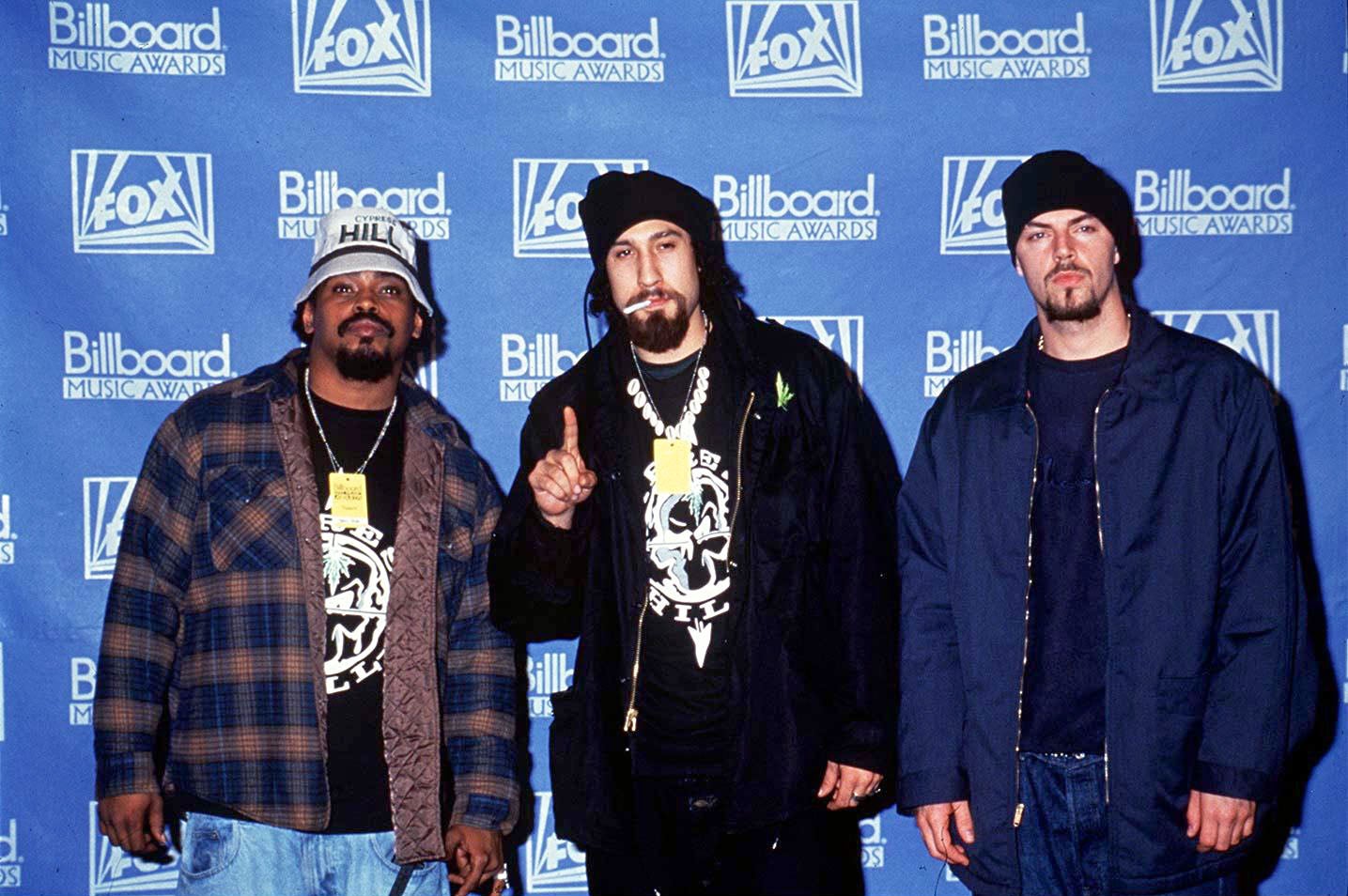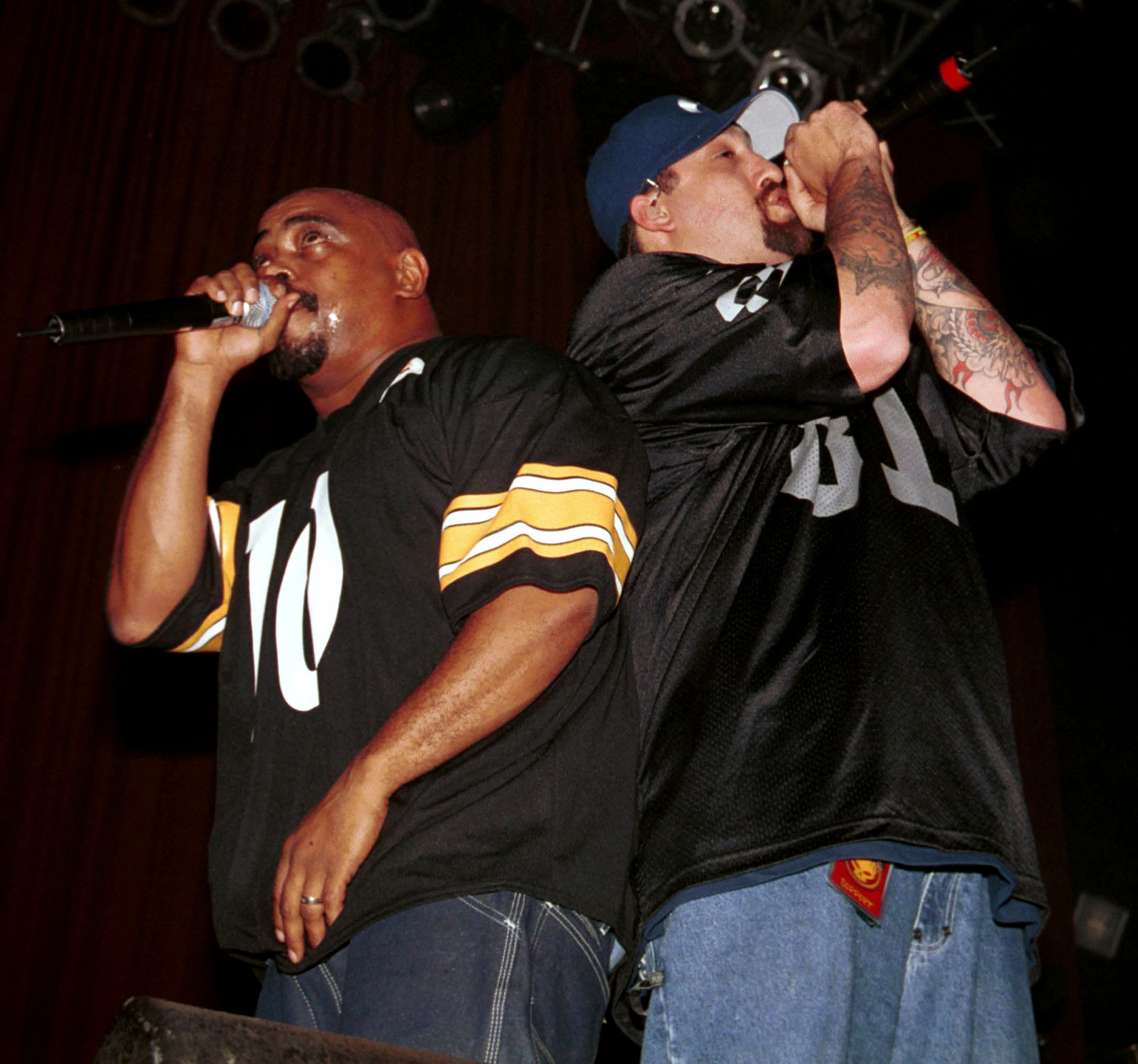Cypress Hill: ‘The next album will be our last’
After 30 years as the ‘Cheech and Chong of hip-hop’, rappers B-Real and Sen Dog talk to Kevin E G Perry about calling time on traditional record releases, how modern rap has lost its edge and, of course, weed


Cypress Hill are railing against the state of modern hip-hop. “In a world where this particular musical genre has tossed substance out the f***ing window, there are those of us that strive to still make something that says something,” says B-Real, who’s spent three decades doing just that as the frontman of these Californian hip-hop giants. “You have all this s*** out there that’s talking about what you have and what you want in terms of materialistic things. For us, we’ve always felt compelled to talk about the realities of life. That’s where we come from, from that first Cypress Hill album all the way down the line.”
Some would say they’ve earned the right to be hyper-critical. Blending funk and hard rock-inflected rap with incendiary lyrics about the horrors of gang violence and the benefits of marijuana, the three-piece are one of the biggest hip-hop bands of all time, selling more than 20 million albums since they formed in 1988.
Their eponymous debut record, released in 1991, immediately established them as musicians with a message. They were one of the first hip-hop groups to rap in Spanish slang, celebrating their Cuban and Mexican heritage, and their vocal advocacy for marijuana helped make the case for legalisation in California. The rap/rock crossover that was to follow in the late Nineties can also be squarely placed at their feet. Indeed, you can blame Cypress Hill for Limp Bizkit.
As his chosen stage name suggests, B-Real – born Louis Freese – was driven by a passion to tell the truth about what it was like to come of age in Los Angeles in the late Eighties. But his musical career almost didn’t happen. At 17, B-Real was shot in a gang-related drive-by in south LA. A hollow-point .22 caliber bullet ricocheted off a wall and punctured his lung, leaving shards near his heart and spine. He was lucky to live and, in his view at least, almost as lucky to survive being taken to the now-closed Martin Luther King Jr Community Hospital, known as “Killer King” after a series of stories about preventable deaths due to poor patient care. With members from the rival Bloods and Crips gangs both treated there, the hospital was often a warzone. After doctors cleared the blood from his lung, B-Real was smuggled out by friends, the bullet fragments still lodged in his body. In last year’s Tres Equis, a graphic novel memoir of Cypress Hill’s early days, he makes his escape from the hospital by being placed inside a body bag. Today, he tells me that part at least was poetic licence. “I did have to sneak out, it just wasn’t in a body bag,” he says with a laugh. “I’m too claustrophobic for that!”
Intense experiences such as these are baked into Cypress Hill’s brand of storytelling. Their first album took listeners to the streets of South Gate, a mostly Latino working-class neighbourhood southeast of downtown Los Angeles. It established their peerless sound: Muggs’ production layered wailing sirens over slowed-down funk, while B-Real’s nasal rapping – delivered as if waiting to exhale a cloud of weed smoke – contrasted with Sen Dog’s deep, gruff vocals. The album opened with “Pigs”, on which they called out corrupt police, before the song that brought them to national attention, the searing “How I Could Just Kill A Man”. It was their way of explaining to the world how young men could be caught up in gang violence.
“At that time, people outside Los Angeles were asking: ‘Why are they killing each other?’” explains B-Real. “It’s due to a lack of opportunity for the kids out there,” he says, adding that while gang violence (known as gang-banging) has declined from its Nineties peak, many problems remain unchanged. “There’s no programmes keeping them off the street, and a lot of them come from broken homes. You’ve got to realise too, some of the gangsters, their fathers were veterans who came back with issues and had no help from the government, no help from the state, had no help from anyone. Their kids were out on the street looking for different mentors, and not all their teachers are going to be teaching them good shit in life. Especially in those areas where gang-banging and drug dealing is prevalent. Now when you ask: ‘Why are these guys killing each other?’ Well, these are some of the f***ing reasons. Just some.”
Having celebrated the 30th anniversary of their debut last year, Cypress Hill this week release their 10th album, Back In Black, a collaboration with Detroit-born rapper and producer Black Milk. There will be one more after that, a last hurrah that will see B-Real and fellow rapper Sen Dog reunite with original Cypress Hill producer DJ Muggs.

“The next album after this one will be the final traditional Cypress Hill album,” reveals B-Real over the phone from LA, although he’s quick to clarify it won’t be the end of the group. “After that, we’re gonna still make music. We’re not not gonna stop, not for nothing, but we want to change up the experience. Putting out an album isn’t what it used to be, and the attention span of folks these days is about songs. We traditionally like to take people on a journey with the album, and it’s harder to do that in this day and time.”
Sen Dog – born Senen Reyes – met B-Real at Bell High School. In 1988, the pair formed Cypress Hill with DJ Muggs – real name Lawrence Muggerud – who had recently moved to LA from New York. “How I Could Just Kill A Man” was one of the first tracks the trio made together, working late into the night at Muggs’ apartment. Speaking over the phone from his home in Las Vegas, Sen Dog recalls how at first they weren’t sure whether the track was any good. “That night we had one of our friends there from our neighbourhood,” he remembers. “Muggs gave us all a ride home, and in the car our friend kept disrespecting that song. Eventually we dropped him off at his house, went a few blocks over and bought a $20 bag of indica weed. We rolled it, started smoking, and then played the song again. All of a sudden, it just jumped out of the f***ing car. We were like: ‘Oh, man, this is f***ing beautiful.’”
Enjoy unlimited access to 100 million ad-free songs and podcasts with Amazon Music
Sign up now for a 30-day free trial. Terms apply.
ADVERTISEMENT. If you sign up to this service we will earn commission. This revenue helps to fund journalism across The Independent.
Enjoy unlimited access to 100 million ad-free songs and podcasts with Amazon Music
Sign up now for a 30-day free trial. Terms apply.
ADVERTISEMENT. If you sign up to this service we will earn commission. This revenue helps to fund journalism across The Independent.
People outside Los Angeles were asking: ‘Why are they killing each other?’ It’s due to a lack of opportunity for the kids out there
The weed probably didn’t hurt. Cypress Hill have always been enthusiastic proselytisers for cannabis, and soon realised that it could help set them apart from other hip-hop acts. “We read High Times magazine,” recalls B-Real. “We weren’t like all the other Los Angeles gangsta rap groups out there. Our sensibility and the way we went about s*** was slightly different. Muggs was like: ‘We could be the Cheech and Chong of hip-hop!’ and it went from there.”
They leaned into the stoner image on 1993’s Black Sunday with toker’s anthems like “I Wanna Get High”, “Legalize It” and “Hits From The Bong”. Their second album was even more successful than their debut, selling over a quarter of a million copies in its first week alone. “I still remember getting Billboard [magazine] and seeing Cypress Hill at No 1 over Janet Jackson, over U2,” recalls Sen Dog. “I was like: ‘This can’t be real.’” B-Real found himself blinking in the spotlight. “It was quite a culture shock to me because I wasn’t the most popular dude in school, or in my circle of friends, or any of that shit,” he says. “To flip from being virtually unknown to not being able to walk in the mall was quite an experience. Fortunately we were able to put the right work ethic behind it, learn what this was about, and grow as men, grow as artists and create other great works aside from that one.”

In 1996, Cypress Hill’s place in pop culture was cemented when they received one of America’s most important cultural accolades. They were immortalised in The Simpsons. Appearing in the “Homerpalooza” episode along with Sonic Youth and The Smashing Pumpkins, the group end up stealing Peter Frampton’s orchestra before getting “nicely toasted” at a cartoon version of Lollapalooza festival. B-Real says they were devoted fans of the show even before they got the gig. “We thought that was awesome, man. It lives forever and people are still watching it, so it’s one of many things where we can say: ‘F***, we were a part of that.’”
At a time when hip-hop groups have become few and far between, Cypress Hill’s consistency and longevity is a rare achievement. “The best part about it was that we did it together,” says Sen Dog. “We had no idea how far our music could go, or what boundaries we could reach, or what doors we could break down.” What’s more, on new album Back In Black their music still sounds as grounded and incendiary as it did when they were starting out. It’s a record that rejects 2018’s journey into psychedelia, Elephants on Acid, in favour of a return to their roots and a hard-edged, boom bap sound underpinning an exploration of contemporary politics and cannabis culture. (“Have you seen the news? They legalised in California / But the feds still tryna put the pressure on ya,” B-Real raps on stand-out track “Open Ya Mind”.)
This May, they’re set to join heavy metallers Slipknot for an extensive tour across North America. B-Real says he’s itching to bring Cypress Hill’s music and message to a new generation. “When you’re a young artist, you’re playing for your peers and you never realise that you’re going to get older!” he says with a wry laugh. “Now we’re seeing folks our age bringing their kids, and that’s a great thing. Bands get passed down as a tradition because people say to their kids: ‘You want to hear this, because this right here shaped what you’re listening to now’. It happened with lots of bands before us. You’d say: ‘This is Led Zeppelin,’ ‘This is the Beatles’ and ‘This is The Rolling Stones.’ As it relates to hip-hop, you say: ‘This is Cypress Hill.’”
‘Back In Black’ is out on 18 March
Join our commenting forum
Join thought-provoking conversations, follow other Independent readers and see their replies
Comments


Bookmark popover
Removed from bookmarks